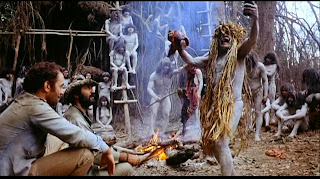Now somebody's going to have to knit the prostate of Jason Voorhees
And you thought there wasn't anything scary about the Twilight franchise.
In what might be the weirdest display of fandom I've ever encountered, here's the womb of Twilight heroine Bella, complete with half-human/half-vampire mutant fetus, made out of felt.
Space rock
Regular readers know that I've got a handful of critical blindspots. No matter how discerning I may try to be, any work that falls in one of those blindspots is getting a more than a fair shake on this blog. These aesthetic Achilles heels include, but are not limited to:
1. giant alligators and/or crocodiles
2. lucha flicks
3. horror or sci-fi themed rock groups
4. anything in which the Creature from the Black Lagoon makes an appearance
The Spotnicks, Sweden's finest Space Age themed surf rock combo, belongs in category 3. Here's their "Rocket Man," performed in full-battle dress.
Cannibal holocaust?
According to CNN:
Five members of the [Amazonian] Kulina tribe are on the run after being accused of murdering, butchering and eating a farmer in a ritual act of cannibalism.
No arrest warrants have been issued because Brazilian authorities are legally restricted from entering Kulina tribal lands, near the Brazil/Peru border.
The victim was herding cattle when he met with a group of Indians who invited him back to their village.
"They knew each other and they sometimes helped one another. They invited him to their reservation three days ago and he was never seen again," Clementino [Village Chief of Staff for the Brazilian town of Envira - CRwM] said.
"The family decided to go into the reservation and that's when they saw his body quartered and his skull hanging on a tree. It was very tragic for the family," he said.
"Who counts dead humans?"
The pan-Euro culture rag Eurozine has posted a jargon-laden, but still fascinating story on the political implications of a post-Soviet literature that writer Dina Khapaeva claims is "overwhelmed by all kind of magic and monsters – vampires, witches and werewolves."
While there's a lot of academic blah blah to wade through, there are more than a few gems worth discussing amongst fans of supernatural horror. Here's Khapaeva on the social context of Russian horror/fantasy:
The nightmare of post-Soviet fiction, which is full of macabre atrocities, consists not only in the triumph of supernatural forces over humans. It is also to be found in the absence of any plausible distinctions between good and evil, which results in the advocacy of narrow-minded selfishness. The main novelty of gothic morality consists in its attitude towards morality itself. Morality is considered something to be avoided, something that can influence the hero's life in the most negative way: "If this guy gave up his selfish wheeling and dealing, his life would certainly become worse. The more morality, the more misfortune", says the vampire-hero of Night Watch. True, such an attitude towards morality stems from a radical reconsideration of the place of humans in the general system of values. Morality as such is dismissed as an irrelevant atavism. Indeed, what moral norms could be applicable to monsters, to vampires – to non-humans?
Of course, the new attitudes towards morality revealed by the world of fantasy fiction are not reducible to the difference between "fiction" and "reality". A simple mental experiment helps to prove this statement. If we remove the vampires, werewolves and witches from these narratives and substitute them with cops, gangsters and their victims, if we parenthesize the witchcraft and the magic, the story would not differ much from a pale description of everyday Russian life.
Curiously, while American's like to frame horror and fantasy in terms of liberation – either in the form of a coded embrace of the other (monster in the closetism) or in the form of some tricked out post-Freudian model of suppressed desires (the turgid sexuality of neo-Victorian high horrorists) – Kaphaeva sees a very different dynamic at work in post-Soviet gothic works:
The main feature of gothic morality consists neither in a rejection of the old ethical system ("hypocritical Soviet morality"), nor in an embrace of a new ethical system (the "strict but fair" rules of the mafia). Gothic morality is a denial of any abstract system of values that could be considered equally pertinent for all members of a given community. Consequently, moral judgment becomes concrete, situational and totally subjective, a deictic gesture that assigns the predicate "good" or "bad" to this or that concrete practice taking place here and now. Power to make such a "moral judgment" is restricted to the boss – the head of the clan, the mafia godfather, the director of a company or rector of a university. The compromise reached by the different clans is also concrete and situational, and is justified not in terms of universal values but in terms of the personal relations between the heads of the clans.
The total denial of morality leads to a cult of force. Gothic morality considers murder an everyday routine – who counts (dead) humans? "Life against death, love against hate, and force against force, because force is above morality. It's that simple," concludes the hero of Night Watch.
She ultimately sees post-Soviet gothic horror and fantasy as creepy, nihilistic resurrection of a sort of cultural Stalinism:
Gothic society does not simply generate a social alternative to democracy: it profits from every loss of democracy. Gothic society has no respect for individuality or privacy, and openly contradicts the idea of human rights. Such social organization leaves no room for public politics and leads to the closing of the public sphere.
She ends with perhaps the bleakest description of Russian social dynamics I've ever read, evoking a system "zona": a form of political and criminal oppression that flourished in the Soviet Era gulag system.
The most important feature of gothic society is the way the zona, the particular form of Soviet camp, is converted into a founding principle of post-Soviet society. Since the inception of the Gulag, the Bolshevik policy was to mix criminals with political prisoners. Criminals were considered by the Soviet regime "socially proximal" and were allowed to impose criminal norms on the rest of the prisoners, thus helping the wardens to run the Gulag.
The zona permeates various aspects of social life and relations in Russia; its legacy is not limited to the post-Soviet prison and army. Aside from its most notorious and obvious manifestations – such as camp slang's transmogrification into the language of power and literature, the convergence of mafia and state; or the unbelievable degree of corruption – the rules of the zona are reproduced in the principles of social organization. The total absence of resistance to camp culture, the incapacity, due to the long tradition of their contamination under the Soviet regime, to distinguish clearly between the zona and "normal life", and the unwillingness to reflect on the history of the concentration camp make today's Russia especially vulnerable to a gothic path of development.
Even I, Lucas, attended the NYC Comic Con
Here's a little snappy snap of everybody's favorite Gill Man at the NYC Comic Con.
And, while we're on the subject of Comic Con, here's a boss Cobra Commander outfit somebody worked up.
Finally, though it was a great costume, this dude in the well-executed Blackhawk costume didn't seem to get much love in the post-Con costume pic collections. Perhaps the reference just doesn't snap with kids today. At ease, flyboy; ANTSS still digs you.
Saturday, February 14, 2009
Link proliferation: Rocket from the womb.
Subscribe to:
Post Comments (Atom)








1 comment:
I haven't commented much, but these have been a great string of articles and links. My dad will probably find the article on the post-soviet fantasy trend interesting.
Post a Comment